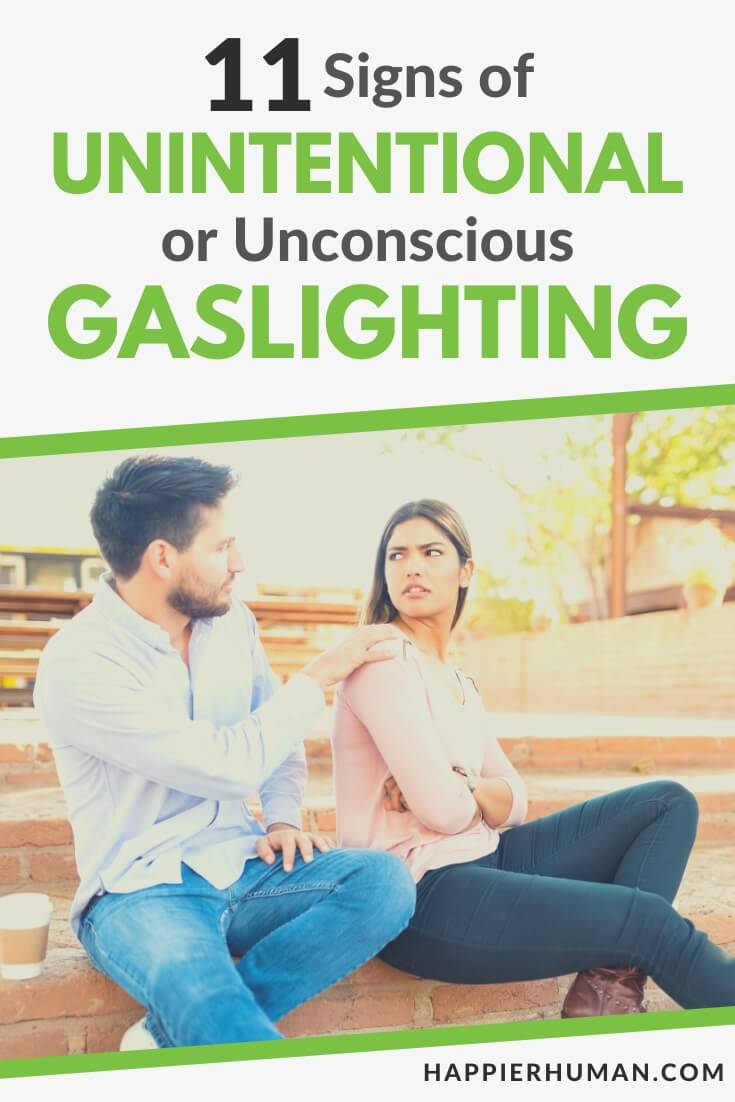There might be affiliate links on this page, which means we get a small commission of anything you buy. As an Amazon Associate we earn from qualifying purchases. Please do your own research before making any online purchase.
Many people are of the view that “gaslighting” is done on purpose. The opposite is true. The emotionally abusive act can occur without the person doing the gaslighting (aka, the gaslighter) knowing what they’re doing.
On that note, I urge you to hold off on turning the tables on the gaslighter in your life until you understand fully what unintentional gaslighting really means and how to know it’s happening.
Done unconsciously or not, gaslighting is a form of psychological manipulation and has adverse mental effects on the person subjected to the manipulation tactic. Learning what the signs of unconscious gaslighting are will prepare you to take action to protect your mental and emotional well-being.
You could also use what you’ve learned to bring the gaslighter to awareness of what they’re doing, especially if it’s someone you care about.
What Is Gaslighting?
Gaslighting is a tactic used consciously or unconsciously to manipulate and obtain psychological control over someone. It involves the skillful and repeated use of words or phrases that create doubt and confusion about things that have happened. The gaslighter will profusely doubt something in the face of evidence that clearly points to the opposite.
The person being gaslit, or “gaslightee”, begins questioning their recollection of events, perception, sense of reasoning, and eventually their sanity.
Gaslighting is common in interpersonal relationships at home and at work, but also happens through social and news media recounts and analyses of events. A distortion of your understanding of what transpired leaves you feeling like something is wrong with your brain.
The term “gaslighting” comes from the 1938 play Angel Street. Later on, Alfred Hitchcock adapted it into the 1944 psychological thriller, Gaslight. In the movie, the gas light downstairs dimmed each time the husband went into the attic where his wife stored her jewelry. When she asked if he was in the attic, he told her she was imagining things. His statement caused her to think she was going crazy.
Gaslighting Example Phrases and Statements
Narcissists, Machiavellians, control freaks, abusers, dictators, and sociopaths are the ones who typically use gaslighting as manipulative tactics. They manipulate you to sway your opinion, exploit you, or make you doubt your senses or experiences.
For example, your abusive partner calls you “stupid,” and then denies it. Sometimes the gaslighter changes their story and tries to convince you they never said otherwise. Point out the inconsistencies and they still won’t admit you’re right.
Here are other examples:
Whether or not the gaslighter is aware of the effects, unintentional gaslighting is still gaslighting and remains a real form of emotional abuse.
The Negative Impact of Gaslighting
Living or working around someone who has a pattern of making statements to intentionally distort the reality of things that transpired may eventually take a toll on your mental health. By sowing seeds of doubt, the perpetrator leaves you feeling disoriented and confused about your version of events.
Eventually, they undermine your self-confidence and self-esteem. Convincing you you’re too sensitive or irrational is their way of making you feel less resilient and capable of making sound decisions.
It also becomes easier for them to control your thoughts, feelings, and emotions. Similarly, spinning the truth to make you out to be a liar can cause you to feel shame or guilt.
All of a sudden, you move from being a confident person to someone who’s always saying sorry for everything. You may even apologize for the perpetrator’s wrongdoings.
Here are other signs gaslighting has taken a toll:
According to Psycom, “The impact can last long after the gaslighter is out of the victim’s life.”
Why Do People Intentionally Gaslight Others?
A person may use gaslighting tactics after having been subjected to the same treatment by their parents or caregivers in early childhood. Misleading statements, sarcasm, defensiveness, and sometimes outright lies are used by gaslighters to create mental confusion and take control of the situation.

Regardless of how one looks at it, gaslighting is an unhealthy way of taking control or dominating someone. In short, it is abuse.
People who take this route to get people to feel stupid and assert control over them tend to be insecure. If they’re dealing with a strong-willed individual, they use the strategy to weaken their resistance and feel superior over them.
Another reason people resort to gaslighting is due to difficulties telling the truth (pathological lying) or expressing themselves using positive communication.
Sometimes they’ll fabricate a conversation and criticize you for not remembering what you told them. According to A Conscious Rethink, making someone question what they heard, saw, felt, or experienced is equivalent to brutal manipulative mind [bleep!]
11 Signs of Unintentional Gaslighting
Anyone can experience gaslighting and not even know it. Thankfully, psychologists and writers are publishing articles and books to bring awareness to the topic. However, unintentional gaslighting is often overlooked.
Of course, gaslighting someone without intending to do so is just as psychologically damaging as when it’s done on purpose. Gaslighters who fall into this group are unaware of what they’re doing. They do not want to manipulate people into feeling confused, unintelligent, or insane.
In fact, people can gaslight others unconsciously through what appear to be innocent everyday comments. They may make those comments as a result of learned behavior or to cope with fear or conflict.
I think one might be more empathetic toward the individual in this instance once they realize there’s no malice behind the act. You’re also entitled to hold a different opinion after reading through the following signs the individual is unaware they’re gaslighting you:
#1. Telling you you’re “wrong” because you have a different opinion
Everyone is entitled to have their own opinions. A difference in opinions is also normal in relationships and other types of social interactions.
However, whenever you share yours with a particular person, they immediately dismiss it as ‘wrong.” In effect, what they’re saying is that their opinion is right or the only one that matters.
The response can come from arrogance or difficulty accepting that they’re capable of making mistakes (perfectionism). Constantly shutting you down and trying to convince you you’re wrong can make you question your knowledge or sense of reasoning.
#2. Accusing you of being too sensitive
Of course, we all have different levels of emotional sensitivity. Although the unconscious gaslighter may care deeply for you, they may still label you as being too sensitive. The accusation usually comes after doing something that hurts your feelings. It’s considered gaslighting because it is a criticism that invalidates your feelings.
The statement also causes you to second-guess your mental strength or resilience. You also don’t feel good about yourself, which may lead to a loss of confidence from frequently being told you’re too sensitive.
#3. Refusing to admit their recollection is incorrect
We all forget pieces of information from time to time. That doesn’t mean we’re lying, or something is wrong with our cognitive functions. While a non-gaslighter would be quick to admit they simply don’t remember the sequence of events, an unconscious gaslighter will stubbornly defend their memory of the event even if it differs from the facts.
By being obstinate, even when you have evidence to the contrary, they’re essentially gaslighting you. You begin to question whose memory is really accurate and whose isn’t.
#4. Treating you to toxic positivity
We’re encouraged to be confident and optimistic regardless of the circumstances, yet too much of it can turn out to have a negative impact on our well-being. So how does this relate to gaslighting?

Let’s say you had a bad day and are feeling down. Your partner or friend says something like, “You need to stop feeling sad and be grateful for all the good things happening for you.”
They may think they’re encouraging you to be optimistic when, in fact, their reaction makes you feel bad for feeling down. Instead of empathizing, they use toxic positivity to minimize or dismiss your feelings.
#5. Using absolutes such as “always” and “never”
Defensiveness has been listed as a way to gaslight someone. “I always” and “I never” or “You always” and “You never” did or said so and so are telltale signs of gaslighting. You hear people talk like that all the time and may not take it for anything. For example, your partner tells you they always do what you ask right away.
That type of language is psychologically harmful as it can make you check your memory to determine if that's true. We all know that no human always does something on time, all the time.
To admit otherwise is to admit they make mistakes, and gaslighters, such as those with narcissist traits, don’t admit they’re wrong.
#6. Victim-playing when you point out their misconduct
Practically every human being doesn’t like it when they’re found out. Of course not, since it means having to confront negative feelings such as shame, guilt, or disappointment in themselves. Interestingly, self-aware individuals are comfortable admitting they screwed up.
If your co-worker or friend tries to get away with accepting what they did was wrong, they could be gaslighting you.
They may say, “I’m the one who suffered in this entire situation,” even though they clearly did you wrong. They may add insult to injury by telling you that you have no right to be upset.
Without knowing what they’re doing, they’re essentially manipulating you to feel sorry for them instead.
#7. Claiming to hear something different from what was said
The unintentional gaslighter may change the narrative to suit them. For example, you arrive at the restaurant to meet your friend at 7.00 PM. They showed up at 8:00 PM, one hour late.
They could simply apologize for their tardiness and provide an explanation, even if it causes them to look bad.
Instead, they say something like, “I could have sworn we agreed to 8:00 PM.” You may start thinking that’s odd or begin apologizing profusely for the misunderstanding.
Your friend could’ve been afraid or ashamed of how you’ll view them for showing up late. To avoid those discomforting feelings, they made it look like you misunderstood the arrangement.
#8. Accusing you of doing what they in fact did
“I never did that.” “It’s you who did it.” “I never said that, you said that.” The situation becomes a he said, she said solely because the person doesn’t want to take responsibility. Only this time, instead of playing the victim, they tell you you’re the one who messed up.
Blaming you seems to be the easy way out, not realizing how their behavior affects you. You begin to question your own memory and reality. “Did I really say that?” you ask yourself, but can’t seem to recall their version of events.
Remember gaslighters tend to feel inferior and insecure. The individual might have used that tactic in fear that you’ll think ill of them.
#9. Being told you cheated to win
Some people can’t stand losing. Oops! An image of a narcissist just popped into my head. They get angry and throw tantrums and accuse you of cheating. You bet your bottom dollar that’s exactly how they behaved as kids.

Saying you cheated is saying you’re dishonest. I don’t think there’s a feeling worse than being called a liar or a cheat when you know to yourself that’s not the case.
Gaslighting you this way forces you to defend yourself or leave feeling awful. You may feel confused and ask yourself what kind of person would do such a thing. An unintentional gaslighter. You didn’t cheat. They lost.
#10. Claiming everything is okay when their expression says otherwise
More often than not, people say they’re okay when you ask how they’re doing. Is it true? Do they actually believe so? The book, authored by Whitney Cummings, I’m Fine…and Other Lies, instantly came to mind. It might be easier for the individual to just say ‘I’m okay,” to avoid getting into a discussion about how they’re truly feeling.
Let’s say it’s your partner. They may claim to be fine to avoid hurting your feelings or getting into an argument. If only they knew you could see something is visibly wrong. “Wait a minute, am I going crazy?” you ask yourself.
#11. Making you think it’s your fault life sucks
This sign isn’t about deflecting and shifting blame. They are outrightly saying you’re responsible for their lack of success or downfall.
Why does an ungrateful child or partner come to mind? As a parent, you might have made countless sacrifices to provide the best you could for your child. Yet, they blame you for being unable to find employment or becoming an addict.
Your partner could do this, too. They may lose a career opportunity because of their own toxic personality traits. Instead of doing self-reflection and improving their behavior, they make you the scapegoat.
It’s deeply hurtful to witness someone you love and support blame you for their setbacks. You may start searching for instances where you went wrong or could’ve done more, when in fact their failures had nothing to do with you.
Final Thoughts on the Signs of Unintentional Gaslighting
Unconscious gaslighting signs are similar to gaslighting done intentionally to manipulate, harm, or confuse others. If you see the signs, you’re not imagining things. You’re being gaslit.
The key difference is the absence of intent or malice. Although the unintentional gaslighter may mean no harm, their statements do have negative psychological effects.
You could call out the gaslighter frankly, reduce your interactions with them, or talk with them from a place of empathy. Help them understand what’s happening, and how it makes you feel, and encourage them to practice mindful communication.
Whatever you elect to do, be sure to take care of your own mental health as well. Consider talking to a licensed therapist if you continue to struggle with low self-esteem or other effects of gaslighting. In the meantime, you can learn more here, 26 Gaslighting Examples & Phrases That Manipulative People Use.


